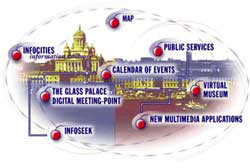New technologies enable city councils to adopt "electronic government" by bringing together information and offering on-line services. At the least, these improve the speed and efficiency of transactions; at best, they encourage residents to participate in local policy and decision-making.
In The Digital Town Hall application developed as part of InfoCities, cities have integrated and upgraded existing on-line and off-line electronic services to provide information about councils, communities, local products and services. Some cities have created interactive services, electronic forms for data entry, etc. Residents can access The Digital Town Hall at home, in public buildings and kiosks. In some cities, penetration has already reached almost 100%.
The application includes:
- City Maps: Such maps are commonly found on web sites but, with The Digital Town Hall, they are dynamically linked to other information and services.
- City Information: The Digital Town Hall provides a range of information and connection to services for residents, businesses, tourists and visitors.
- Council Services: The Digital Town Hall provides access to council information and services for residents, councillors and officers.
- On-Line Data Collection: The Digital Town Hall may also offer on-line forms to speed up processes.
- 'Tele-democracy' and Participation: Residents may debate with politicians and experts about public projects through internet chats, discussion forums and voting in The Digital Town Hall.
- Business Services: Companies can promote themselves and collaborate with others through a virtual Market Place where business information is displayed.
- Services for Tourists and
Visitors: Tourists and visitors can browse and plan their visit in advance
by entering The Digital Town Hall via the internet. When they arrive at
their destination, tourists and visitors can use public access points.

Benefits of these Services
Quality of life:
- Many people - especially older people and people with disabilities Ð are unaware of technologies that may improve their quality of life. Through using local information services, many have become aware of them and used them to improve their living conditions.
- The integrated services encourage co-operation between residents and public, private and voluntary sector organisations.
Participation:
- With access to a higher quality of information, residents may gain a better understanding of developments in their cities and may be encouraged to enter political discussion and debate. In the long run, this would benefit the whole city and even affect national policies.
- Discussion groups increase the transparency of councils and emphasise the role of residents in decision-making. They enhance cultural contacts and exchanges at every level (local, national, European and international).
Efficiency and Service Quality:
- The Digital Town Hall provides users with easy access to current information. Thus they are able to anticipate and respond quickly to changes.
- Users don't need to understand internal, departmental structures and protocols in order to access the information and services they want.
- Private companies have collaborated with city councils, ensuring a unified strategy and platform for ICT and more comprehensive data collection and storage.
- Officers can work more quickly by accessing all services through a single interface.
- Integrated systems provide a strategic tool, enabling the council to target services to residents' requirements and to monitor take-up and satisfaction. Councils can also remove duplication and reduce the costs of information and service provision.
- Economically innovative services are created which offer new and added value for residents, businesses and councils.
- The application simplifies Council business and maintains or increases public confidence in council processes.
- The quality of presentation is improved because the technical requirements of publishing information on the Internet are far higher than the media normally used to disseminate council information.
European Benefits: The Digital Town Hall provides services at local, national and European level: for example, employment opportunities across the European Union; publicising information from the European Parliament, Commission, and Court of Justice; offering consumer advice.
The application stimulates travel and tourism within the EU by providing integrated information about aspects such as public transport, cultural and local attractions.